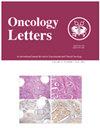Progress in cancer research on the regulator of phagocytosis CD47, which determines the fate of tumor cells (Review).
IF 2.2
4区 医学
Q3 ONCOLOGY
引用次数: 0
Abstract
Cluster of differentiation 47 (CD47) is a transmembrane protein that is widely and moderately expressed on the surface of various cells and can have an essential role in mediating cell proliferation, migration, phagocytosis, apoptosis, immune homeostasis and other related responses by binding to its ligands, integrins, thrombospondin-1 and signal regulatory protein α. The poor prognosis of cancer patients is closely associated with high expression of CD47 in glioblastoma, ovarian cancer, breast cancer, bladder cancer, colon cancer and hepatocellular carcinoma. Upregulation of CD47 expression facilitates the growth of numerous types of tumor cells, while downregulation of its expression promotes phagocytosis of tumor cells by macrophages, thereby limiting tumor growth. In addition, blocking CD47 activates the cyclic GMP-AMP (cGAMP) synthase/cGAMP/interferon gene stimulating factor signaling pathway and initiates an adaptive immune response that kills tumor cells. The present review describes the structure, function and interactions of CD47 with its ligands, as well as its regulation of phagocytosis and tumor cell fate. It summarizes the therapeutics, mechanisms of action, research advances and challenges of targeting CD47. In addition, this paper provides an overview of the latest therapeutic options for targeting CD47, such as chimeric antigen receptor (CAR) T-cells, CAR macrophages and nanotechnology-based delivery systems, which are essential for future clinical research on targeting CD47.关于决定肿瘤细胞命运的吞噬调节因子 CD47 的癌症研究进展(综述)。
分化簇 47(CD47)是一种跨膜蛋白,广泛适度地表达于各种细胞表面,通过与其配体整合素、凝血酶原-1 和信号调节蛋白 α 结合,在介导细胞增殖、迁移、吞噬、凋亡、免疫平衡及其他相关反应中发挥重要作用。在胶质母细胞瘤、卵巢癌、乳腺癌、膀胱癌、结肠癌和肝细胞癌中,癌症患者的不良预后与 CD47 的高表达密切相关。CD47 表达的上调有利于多种肿瘤细胞的生长,而其表达的下调则会促进巨噬细胞吞噬肿瘤细胞,从而限制肿瘤的生长。此外,阻断 CD47 还能激活环 GMP-AMP (cGAMP) 合成酶/cGAMP/干扰素基因刺激因子信号通路,启动杀死肿瘤细胞的适应性免疫反应。本综述介绍了 CD47 的结构、功能和与其配体的相互作用,以及它对吞噬作用和肿瘤细胞命运的调控。它总结了针对 CD47 的治疗方法、作用机制、研究进展和挑战。此外,本文还概述了靶向 CD47 的最新治疗方案,如嵌合抗原受体(CAR)T 细胞、CAR 巨噬细胞和基于纳米技术的递送系统,这些对于未来靶向 CD47 的临床研究至关重要。
本文章由计算机程序翻译,如有差异,请以英文原文为准。
求助全文
约1分钟内获得全文
求助全文
来源期刊

Oncology Letters
ONCOLOGY-
CiteScore
5.70
自引率
0.00%
发文量
412
审稿时长
2.0 months
期刊介绍:
Oncology Letters is a monthly, peer-reviewed journal, available in print and online, that focuses on all aspects of clinical oncology, as well as in vitro and in vivo experimental model systems relevant to the mechanisms of disease.
The principal aim of Oncology Letters is to provide the prompt publication of original studies of high quality that pertain to clinical oncology, chemotherapy, oncogenes, carcinogenesis, metastasis, epidemiology and viral oncology in the form of original research, reviews and case reports.
 求助内容:
求助内容: 应助结果提醒方式:
应助结果提醒方式:


